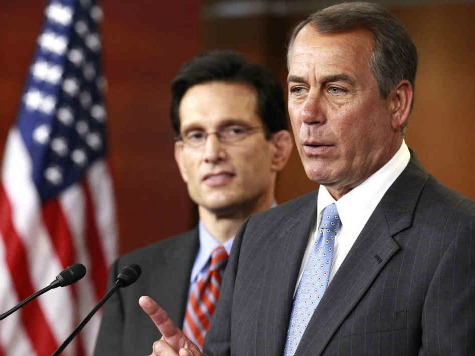
After House Speaker John Boehner failed to get enough Republicans to support his “Plan B” proposal on Thursday and was forced to pull the bill, lawmakers on both sides of the aisle openly expressed that they had no idea if the country would go over the so-called fiscal cliff.
Even if “Plan B” had made it to a vote in the House and passed, it likely would not have passed the Senate, and President Barack Obama would have vetoed it anyway had it reached him.
The House and Senate are adjourned until December 27, which leaves a very tight window for a deal to be made. On Friday, Obama indicated he was still speaking about a deal with Boehner and Senate Majority Leader Harry Reid. He urged Members of Congress to come back to Washington after drinking “eggnog” over Christmas to agree to raising taxes on those making more than $250,000 a year, which Obama said the Senate has already voted for.
“It doesn’t take that much work,” the president claimed with a straight face.
But the fiscal cliff negotiations got a lot tougher when Boehner, along with his lieutenants Eric Cantor and Kevin McCarthy, botched his “Plan B” vote after confidently — and prematurely — declaring on Wednesday that he had enough votes to get his proposal through the House.
He did not, and his Speakership, as a result of his misplayed hand, may be threatened. This will make it tougher for Boehner to bring a deal to avert the fiscal cliff to a vote on the House floor that is either worse than his “Plan B” proposal, or that will primarily be supported by Democrats. Both scenarios could greatly threaten Boehner’s Speakership, especially if it occurs next week.
Already, some conservative groups are calling for Boehner’s removal. American Majority CEO Ned Ryun has said on numerous occasions he would like to see Rep. Jim Jordan (R-OH), who headed the Republican Study Committee during the last Congress, as the next House Speaker. On Friday, Ryun said Boehner’s “Plan B” vote “embarrassed” the conservative movement.
A spokesperson for the group told Breitbart News:
Speaker Boehner’s power is at an end, and it’s time to replace him with someone who is serious about fixing our debt and enabling job creators. This is a harbinger of January 3. More than 35 members stood against Boehner tonight, and we only need half that to end his reign.
If 16 Republicans do not vote for Boehner for Speaker on January 3rd and a viable challenger emerges, a conservative candidate like Jordan could potentially challenge Boehner for his Speakership.
Of course, talk about replacing Boehner would not be complete without the mention of House Majority Leader Eric Cantor, who has coveted Boehner’s job for some time. Boehner and Cantor have had a history of infighting because of Cantor’s ambitions, but a Cantor speakership may not satisfy conservatives opposed to Boehner either.
Cantor voted for the TARP bailout, and his wife my have directly benefited from it; she was a “prominent officer of a TARP-beseeching bank.”
J. Robert Smith accused Boehner and Cantor of “legislating against their party’s conservative base.” He also claimed they have botched negotiations with Obama and the “PR war that rages to the hearts and minds of Americans (such is just a continuation of the ham-handed Romney campaign’s poor communications and outreach strategies during the presidential election).”
He blasted the pair, declaring, “conservatives shouldn’t accept or settle” for a reshuffling of one set of establishment Republicans for another; they should support true conservatives who are also first-rate thinkers and strategists to “replace the leadership.”
Boehner must calculate his next moves with this backlash against him in mind. Some lawmakers on both sides believe going over the fiscal cliff in the short term may actually benefit Democrats and Boehner politically. Boehner could retain his Speakership and then cut a compromise with Obama, which is what Rep. Chris Van Hollen (D-MD) suggested earlier.
On the other hand, since Democrats will have 55 votes in the Senate when the new Congress is sworn in on January 3rd, they would need fewer Republicans in the Senate to cross over to vote for a compromise bill that would inevitably raise taxes.
Further, if the country goes over the fiscal cliff temporarily, Members of Congress can claim they are negotiating to cut taxes instead of raising them, which would make it easier for some Members to vote for a bill they otherwise may not have.
If Obama and Members of Congress want to avert the fiscal cliff, the Senate could try to win over Republicans by adding “sweeteners” to the bill raising taxes for those making over $250,00 a year and try to get that passed in the House.
The parties could also agree on a so-called “grand compromise” that raises taxes, structurally reforms entitlements, and even potentially deals with the debt ceiling; this is also important because Congress must agree to raise the debt ceiling by February, or the country may again face a downgrade of its credit rating.
Boehner proposed taking the debt ceiling limit off the table for one year in exchange for significant spending cuts and structural reforms to entitlement programs, while Obama initially proposed giving himself unprecedented powers to unilaterally raise the debt ceiling whenever he wanted without Congressional approval.
An agreement on the debt ceiling has a better chance of getting enacted in a “grand bargain” after the country goes over the fiscal cliff than in a deal struck during the three-day window after Christmas and before the budget deadline.

COMMENTS
Please let us know if you're having issues with commenting.